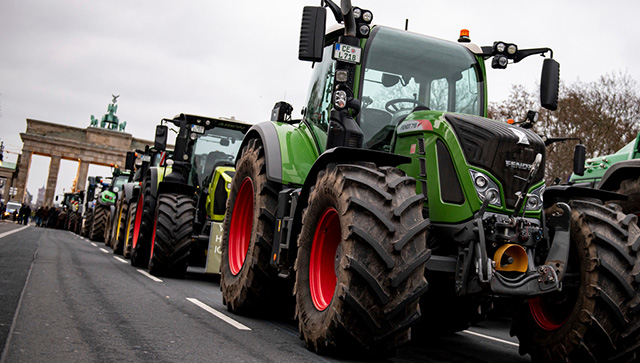In major German cities, a striking sight has captured the attention of residents and onlookers: long rows of tractors forming a formidable presence in the heart of the capital, Berlin, and surrounding iconic landmarks like the Brandenburg Gate. Munich, Bonn and Cologne have also witnessed this unique demonstration where farmers are making a stand against subsidy cuts that directly affect their livelihoods.
A familiar scene from India
This scene might resonate with people in India who recall a massive farmers’ movement a few years ago. The banners displayed by the German farmers echo sentiments that transcend borders with messages like “No farmers, no food, no future”, underscoring the universality of the challenges faced by agricultural communities.
The driving force behind this protest in Germany is the anger among German farmers over subsidy cuts, particularly the recent decision to eliminate diesel subsidies for agricultural use. For years, Germany had heavily subsidised diesel for farmers, effectively allowing them to pay half the standard rate. However, last month, the government decided to scrap this subsidy under duress.
“We as farmers had to endure a lot of cuts of all kinds in recent years, we were handed orders and regulations, and the announced cut for agricultural diesel was the tipping point. The overall resentment finally broke into the open and ended up with this demonstration here," said farmer Ralf Hickmann.
Government’s budget deficit dilemma
The decision to end the diesel subsidy was not voluntary but a consequence of a budgetary shortfall. Berlin had initially planned to fund these subsidies using money earmarked for the COVID-19 pandemic. However, a German constitutional court ruled against this, leaving the government with an $18 billion budget deficit. To address this deficit, the government targeted various sectors, including agriculture.
Quick Reads
View AllThe proposed plan to abruptly end the entire diesel subsidy and terminate tax breaks on agricultural vehicles triggered outrage among German farmers. Faced with staunch opposition, the government was forced to backtrack. It decided to maintain tax breaks on agricultural vehicles and gradually phase out the diesel subsidy with a complete removal slated for 2026.
Chancellor’s perspective
German Chancellor Olaf Scholz defended this compromise as the best deal on the table emphasizing the need for balance.
“In view of the fact that the government has made concessions to farmers, I think it’s also important to keep things in proportion and to strike the right balance,” said Chancellor Scholz.
However, the farmers remain resolute, signaling that the issue extends beyond taxes to the very viability of farming itself.
Farmers’ demands
Frieda Salzwedel, spokesperson for the Union ‘Free Farmers,’ emphasized that the diesel and vehicle taxes were merely the tipping point.
“The occasion was, of course, the debate on diesel and vehicle taxes. But that was just the icing on the cake, on top of all the constraints we are increasingly faced with. That’s why we’re here today. We absolutely need an agricultural policy that is committed to fair conditions for family farms in Germany and to the highest possible degree of self-sufficiency here at home,” said Salzwedel.
What lies ahead
As tractors continue to line the streets, honking horns in protest, the question remains: Will the German government listen to the grievances of its farmers and find a middle ground, or will it opt for a confrontation? The coming weeks will unveil the fate of this standoff and determine the future of German agriculture.
Views expressed in the above piece are personal and solely that of the author. They do not necessarily reflect Firstpost’s views.
Read all the Latest News
, Trending News
, Cricket News
, Bollywood News
,
India News and Entertainment News here. Follow us on
Facebook
,
Twitter
and
Instagram
.
)